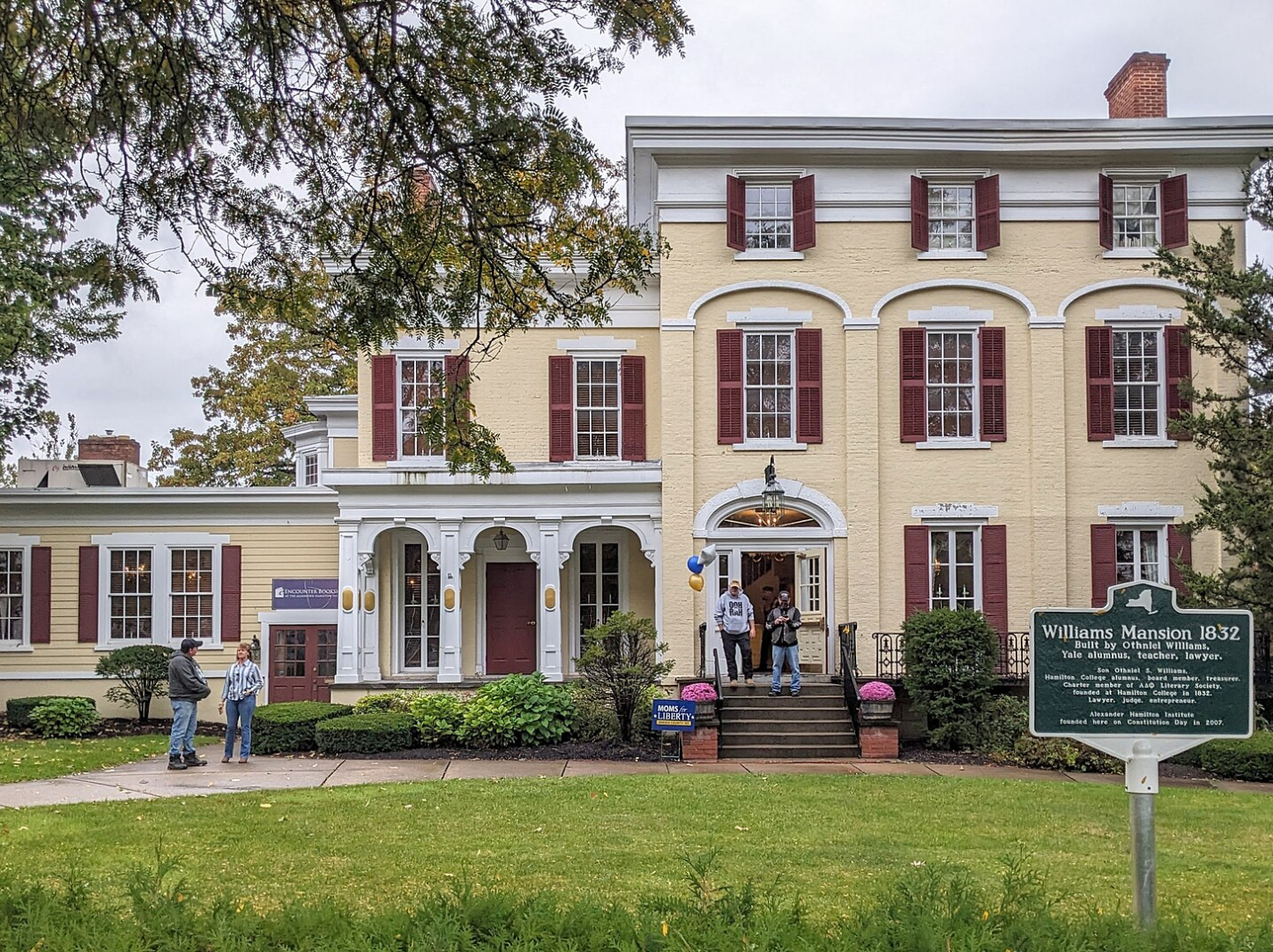
Editor’s Note: This announcement comes from the Alexander Hamilton Institute for the Study of Western Civilization and is crossposted here with permission.
The Alexander Hamilton Institute for the Study of Western Civilization (AHI) is pleased to announce that it will offer two courses for the fall semester, 2025. All AHI courses are free and open to the public. Advance signup is requested. Should you not be able to afford a copy of any required course reading, AHI will purchase it for you.
Course #1: Dr. David Frisk will lead both an in-person and online course, “The American Revolution’s Impact and Legacy.”
Course #2: Former Pentagon speech writer Lauren Weiner will lead a second course, “American Comedy, American Ideology: The Bostonians by Henry James,” using Zoom.
Course #1: “The American Revolution’s Impact and Legacy.” Instructor: David Frisk, Ph.D.—AHI Resident Fellow.
In-person: Dr. Frisk’s in-person class will meet on Tuesdays at the AHI, 21 West Park Row, Clinton, NY, in the Presidential Room from 6:30 p.m. to 8:30 p.m., September 16 through December 9.
Online: His online class via Zoom will meet on Wednesdays from 7 p.m. to 9 p.m. (Eastern time), September 17 through December 10.
To sign up, or for more information, please contact Dr. Frisk at: [email protected], or (202) 999-5751.
On July 4, 2026, the United States will have its 250th birthday. Following up on last semester’s course about the American Revolution’s political events, military events, and historical background, this class will examine its lasting impact—especially its legacy in our public life from the 19th century to the present.
We will learn how the Revolution substantially changed America, then how its successful revolt against tyranny, its principles including those in the Declaration of Independence, and to some extent the conduct of the Revolutionary War have been perceived, interpreted, honored, and debated throughout American history. (A major example is Lincoln’s use of the Revolution and its principles.) There will also be some consideration of differences among historians and political scientists about major aspects of the Revolution.
In the first part of the course, we will read The Radicalism of the American Revolution by Gordon Wood, one of the most highly acclaimed and prominent historians of the Revolution and Founding. Class members are asked to buy the book, preferably a printed copy. In the middle and later parts of the course, a wide range of reading from other books—and a few primary-source documents, such as key speeches—will be assigned and e-mailed. The total reading will be 25 to 30 pages per week.
Each class meeting will have a lecture-plus-discussion format, with more than half the time for discussion. There will be a 10-minute break.
In addition to the American Revolution, Dr. Frisk’s past AHI classes have examined such themes as Alexander Hamilton, Thomas Jefferson, Democracy in America by Alexis de Tocqueville, the Civil War, presidential power, several aspects of American constitutional history, the development of the idea of liberty, conservative political philosophy, and the history and evolution of American political parties.
Dr. Frisk holds a Ph.D. in political science from Claremont Graduate University (2009), where he specialized in American politics and political philosophy. He is the author of the widely acclaimed If Not Us, Who? William Rusher, National Review, and the Conservative Movement (ISI Books, 2012) and is writing an intellectual biography of the legendary political scientist Willmoore Kendall for Encounter Books.
Course #2: “American Comedy, American Ideology: The Bostonians by Henry James,” using Zoom.” Instructor: Lauren Weiner
Lauren Weiner’s online course, using Zoom, will meet weekly during seven sessions on Mondays from October 6 through November 17 at 7:00 p.m. to 8:00 p.m. (Eastern time).
To sign up, or for more information, please contact Lauren Weiner at: [email protected].
Henry James is a towering figure in American letters. His satirical novel, published in book form in 1886, centers on a young woman, Olive Chancellor, a severe and conscience-stricken descendant of the Puritans. Olive is acutely aware of herself as a toiler in the cause of equality from a position of social privilege. To her door one day comes her impoverished Mississippi cousin, Basil Ransom, a veteran of the late Confederacy, whom she has never met.
With this set-up, Henry James embarks on one of his funniest and most politically acute representations of what it means to be American. The same modern doctrines that we looked at last semester in Dostoevsky’s Devils (
Class members are asked to buy the Penguin Classics edition of The Bostonians, edited by Richard Lansdown (350 pages).
Lauren Weiner’s writing life has taken her to jobs as an editor, reporter, Capitol Hill staffer, and Pentagon speechwriter. She wrote speeches for former Senator Jon Kyl (R-Arizona) and spent three years as a speechwriter to Secretary of Defense Robert Gates. Her articles and reviews on political, literary, and historical topics have appeared in many publications, including the Wall Street Journal, Commentary, TheFederalist.com, the Weekly Standard, AmericanPurpose.com, the New Criterion, the Washington Times, and the Baltimore Sun.
Image: “The Williams Mansion in Clinton, NY” by Apocheir on Wikipedia